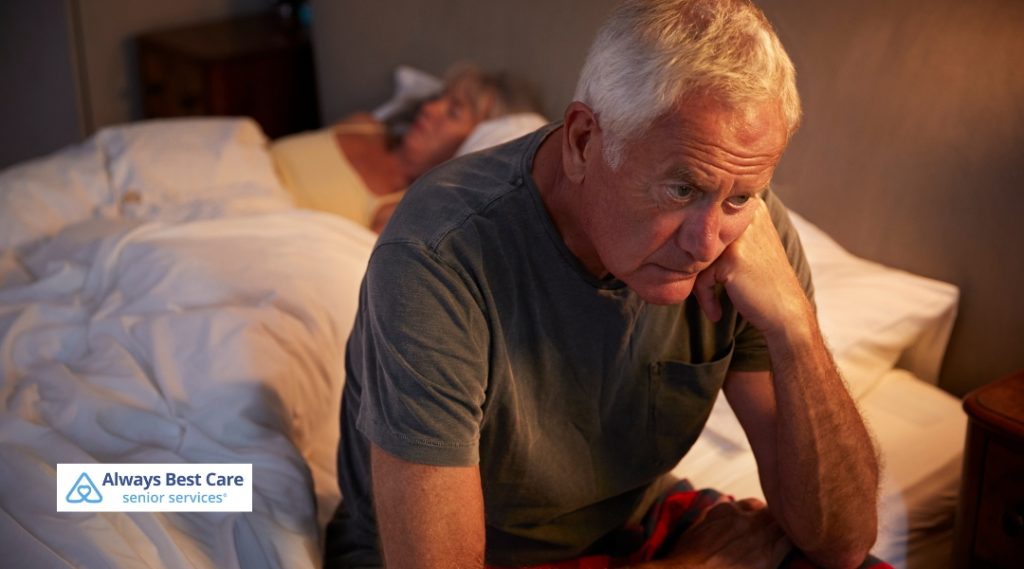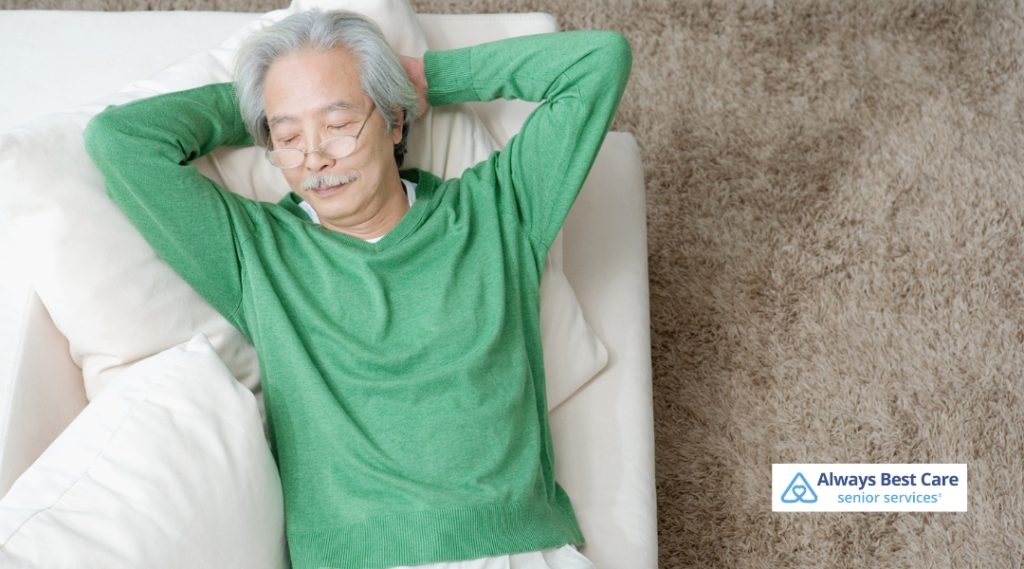Say Goodbye to Sleepless Nights: Senior Solutions for Insomnia in Charleston, SC

If you’re a senior in Charleston, SC, and find yourself tossing and turning every night, you’re not alone.
Insomnia among seniors is a widespread issue that can have serious impacts on health and quality of life. Sleepless nights may seem like a minor inconvenience, but for many seniors, they lead to chronic fatigue, cognitive decline, and even mood changes.
The good news is that overcoming insomnia doesn’t have to be a daunting task. With the right strategies and support, seniors can say goodbye to sleepless nights and regain their much-needed rest.
In this article, we’ll explore the causes of insomnia, practical solutions, and how Always Best Care of Charleston can help.
Table of Contents
Common Causes of Insomnia in Seniors
Sleep problems in seniors don’t just happen overnight. Various factors contribute to sleepless nights, and understanding these causes is the first step toward finding a solution.
- Health Conditions: Chronic conditions like arthritis, diabetes, or heart disease can make it harder for seniors to fall asleep or stay asleep. The discomfort or pain from these conditions often disrupts the natural sleep cycle.
- Medications: Many medications commonly prescribed to seniors can interfere with sleep. Medications for pain, blood pressure, and even allergies can all contribute to insomnia.
- Changes in Circadian Rhythm: As we age, our bodies naturally shift in their sleep patterns. Seniors often experience less deep sleep, and the circadian rhythm can become out of sync with the natural day-night cycle, making it difficult to get a restful night’s sleep.
- Lifestyle Factors: Poor sleep hygiene, such as inconsistent sleep schedules or excessive screen time before bed, can contribute to insomnia. Additionally, stress, anxiety, or depression—often linked to aging—can also keep seniors awake at night.

The Impact of Insomnia on Senior Health
- Cognitive Function: Lack of sleep can impair cognitive abilities, leading to memory problems, difficulty concentrating, and poor decision-making.
- Emotional Health: Chronic insomnia can contribute to feelings of irritability, depression, or anxiety. Sleep-deprived seniors are more likely to feel moody or withdrawn, which can affect their relationships and quality of life.
- Physical Health Risks: Sleep is essential for the body to repair and regenerate. Without enough rest, seniors may experience weakened immune systems, increased inflammation, and a higher risk of chronic conditions such as heart disease or high blood pressure.
- Increased Risk of Accidents: When sleep-deprived, seniors are more prone to falls and accidents. Sleep deprivation affects coordination, balance, and reaction time, which can lead to serious injuries.
4 Tips to Create a Senior-Friendly Sleep Environment
A peaceful sleep environment can work wonders for improving sleep quality. Seniors can make simple changes to their bedrooms that promote restfulness:
- Keep It Dark: A dark room is ideal for sleep. Use blackout curtains to block out any streetlights or external lights that could interfere with your sleep cycle.
- Maintain a Comfortable Temperature: Your bedroom should be cool, not too hot or too cold. A comfortable temperature promotes better sleep and prevents waking up in the middle of the night feeling overheated or chilly.
- Minimize Noise: Noise is a major sleep disruptor. Try using earplugs or a white noise machine to mask distracting sounds outside or within the home.
- Choose the Right Mattress and Pillows: A comfortable bed is essential for a good night’s sleep. Seniors should invest in a mattress that offers the right level of support and pillows that align the neck and head for optimal comfort.

Lifestyle Changes to Improve Sleep Quality
- Establish a Consistent Sleep Schedule: Go to bed and wake up at the same time every day, even on weekends. This helps set your body’s internal clock, making it easier to fall asleep and wake up naturally.
- Get Active During the Day: Physical activity is a natural sleep aid. Try to incorporate at least 30 minutes of exercise into your daily routine. However, avoid exercising too close to bedtime, as it may keep you energized.
- Limit Naps: While napping can be a great way to recharge, long naps during the day can interfere with nighttime sleep. Keep naps to around 20-30 minutes.
- Avoid Stimulants and Heavy Meals Before Bed: Caffeine, nicotine, and heavy meals can disrupt sleep. Try to avoid consuming these stimulants several hours before bedtime.
When to Seek Professional Help for Insomnia
If sleepless nights persist despite making lifestyle changes, it may be time to seek professional help. A doctor or sleep specialist can diagnose the underlying cause of insomnia and recommend effective treatments:
- Cognitive Behavioral Therapy for Insomnia (CBT-I): This is a structured therapy that helps individuals change behaviors and thoughts that negatively impact sleep. It’s often more effective than medication for treating insomnia.
- Medication: In some cases, doctors may prescribe sleep aids. However, these should only be used temporarily and under the guidance of a healthcare provider, as they can have side effects and lead to dependency.
- Sleep Studies: If insomnia is suspected to be caused by an underlying sleep disorder, such as sleep apnea, a sleep study may be necessary to get a clearer picture of what’s going on.

How Always Best Care of Charleston Can Help
At Always Best Care of Charleston, we understand the importance of sleep for seniors. That’s why we offer a range of services to help seniors manage insomnia and improve their overall well-being:
- In-Home Care Services: Our compassionate caregivers can assist with creating a sleep-friendly environment, help seniors with daily routines, and offer support with managing medications that may be interfering with sleep.
- Companionship and Emotional Support: Sometimes, insomnia is caused by stress or anxiety. Our caregivers provide companionship and emotional support, ensuring that seniors feel comforted and secure in their own homes.
- Health Monitoring and Wellness Checks: We also offer regular health monitoring and wellness checks to ensure that seniors are managing any chronic conditions or medications that may be impacting their sleep.
FAQs
1. What are the best sleep habits for seniors?
Establishing a consistent sleep schedule, getting regular exercise, limiting naps, and avoiding caffeine or heavy meals before bed can all improve sleep quality.
2. Can medication help seniors with insomnia?
Medication can sometimes be helpful, but it should be used with caution. Always consult with a doctor before using sleep aids, as they can have side effects and should not be relied upon long-term.
3. When should seniors see a doctor about insomnia?
If sleep problems persist for more than a few weeks or are affecting daily life, it’s time to consult a healthcare provider. They can diagnose the cause and recommend effective treatments.
Say Goodbye to Sleepless Nights in Charleston, SC
If you or a loved one are struggling with insomnia and need extra support, we are here to help. Contact Always Best Care of Charleston at (843) 996-4498 to schedule a care consultation and learn how our in-home care services can improve your quality of life. A restful night’s sleep is just a call away.





